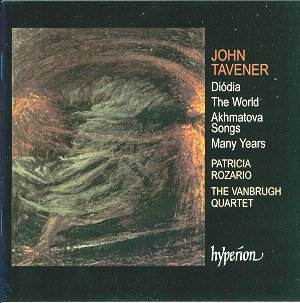John TAVENER
The World (string quartet and soprano)
Diódia (string quartet)
Many Years (soprano and string quartet)
Akhmatova Songs (soprano and string quartet)
 The Vanbrugh
Quartet
The Vanbrugh
Quartet
Patricia Rozario, soprano
 Hyperion
CDA67217 [DDD
62:32]
Hyperion
CDA67217 [DDD
62:32]
Crotchet
Amazon UK Amazon US

These days there seems to be a new Tavener disc released every month although
this one is of particular interest, focusing as it does, on his third string
quartet of 1995, Diódia. Tavener's first two quartets, The
Hidden Treasure (1989) and The Last Sleep of the Virgin (1991)
drew their musical material from large-scale choral works written around
the same time, namely The Resurrection and The Apocalypse.
In the same way the new work has developed out of The Toll Houses,
of which Diódia is a literal translation, the new major work
being scheduled for premiere in Carnegie Hall later this year. The original
inspiration stems from a book by a Californian monk, Father Seraphim Rose,
which deals with the Orthodox concept symbolising "the posthumous states
of being of the soul, where it is decided whether the soul spends a certain
period of time in hell and a certain period of time in heaven".
My initial reservation about this quartet was whether it could sustain its
thirty five minute duration, given the intimate nature of the quartet medium
allied with the contemplative nature of Tavener's music. This concern proved
unjustified, largely due to the way in which the composer presents his material,
having abandoned the conventional use of Western form and structure in his
music. Instead he alternates "blocks" of sound, with no conventional development,
and it is to his credit that this comes across as entirely natural, an indication
of the oneness he feels with his methods of composition. The meditative,
contemplative material is certainly here, but the contrasting passages in
between often demonstrate something approaching savagery, being ritualistic,
even ethnic in their sound world. There is indeed clear reference to Tavener's
interest in Indian and Sufi music in his use of the bandir, a drum on which
an insistent rhythmic figure is tapped out. Traditionally symbolising the
heartbeat, the bandir returns at various points during the work, most memorably
at the end, where it concludes the quartet alone. The Vanbrugh Quartet are
proving to be an excellent signing by the Hyperion label (for further listening
I would strongly recommend their 1999 release on the same label of John McCabe's
Third, Fourth
CDA67078
and Fifth Quartets, riveting stuff), and they live up to that reputation
here with a highly dedicated performance of Diódia which
demonstrates an impressive affinity with the music.
Patricia Rozario has become synonymous with Tavener's music with her title
role performance in Mary of Egypt in 1992. Since then she has become
the composer's first choice in any works requiring a solo soprano and it
is hard to imagine that anyone could be better suited to his music. The
frequently stratospheric soaring lines and eastern ornamentations seem quite
natural to her (a clue here perhaps in Rozario's roots - she was born in
Bombay). Rozario features in all three of the remaining works on the disc,
the most substantial being the Akhmatova Songs, which were originally
written in 1993 specifically for Rozario and the cellist Steven Isserlis
and re-scored in 1995. Tavener had turned to the poetry of Akhmatova previously
(Akhmatova Requiem 1979/80), attracted by the poetry's lack of complexity
and directness, something which is beautifully reflected in these at times
bleak, but moving settings. A similar feeling of intensity is achieved in
The World, a setting of an astonishing poem by Kathleen Raine, whilst
Many Years, the remaining piece on the disc and a miniature in comparison,
was written in 1998 as a brief but touching fiftieth birthday present for
the Prince of Wales, a close personal friend of the composer.
Philip Borg-Wheeler provides an informative and comprehensive booklet note
and the music has been captured with excellent clarity and balance by the
Hyperion engineers. All in all, a first class release, which Tavener enthusiasts
should not be without.
Christopher Thomas

